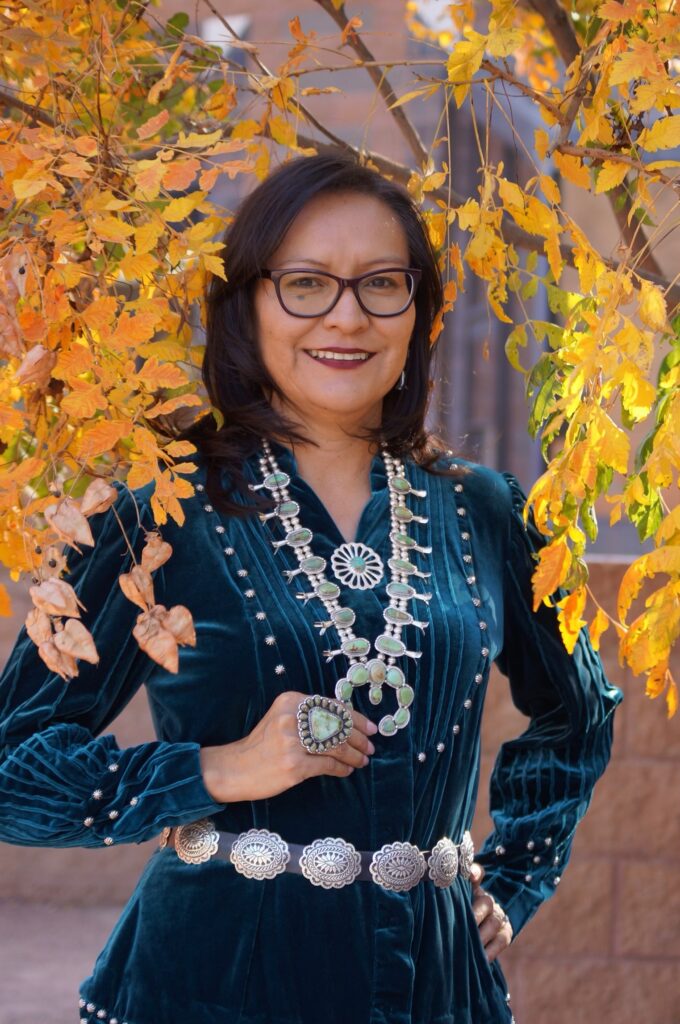An Interview with First Lady of the Navajo Nation, Mrs. Phefelia Nez
This year the Office of Equity & Engagement had the opportunity to interview the former First Lady of the Navajo Nation, Mrs. Phefelia Nez. Phefelia is a community activist, indigenous Leader, Educator, volunteer, and board member of a myriad of tribal organizations across the Navajo Nation community.
During the interview, Phefelia shared that she’s always had a strong sense of connectedness to the land, legacy, and traditions, inherited by those who blazed a trail before her.

“As Navajos, we were removed from our homelands during the Long Walk (1864-1868). We signed a treaty with the federal government and were allowed to return to a portion of our native homelands within our four sacred mountains. Federal Indian Policy over time has tried to erode tribal sovereignty but tribal peoples have always fought hard to retain their homelands, cultural practices, and languages as well governing themselves. In current times, indigenous peoples are very diverse in the lifestyles they live – some stay on the homelands, others live and work off the tribal lands. What is common throughout is that we never take it for granted that previous generations have had to endure and fight for us to have these opportunities and with that comes a sincere sense of responsibility to protect what’s been attained and advocate for what’s still needed for our future generations.”
When asked what are some of the most pressing issues currently facing Indigenous communities?
Phefelia shared an emphasis on education, “As a homeschooler for the past ten years and having worked with children and youth in a children’s shelter, teen group home, and a juvenile detention center, I’ve learned the early years of a person’s life are so crucial. The home environment that a growing child from conception through the next 5-8 years of life sets them on a trajectory of positive or negative outcomes. If the right resources in terms of support services and early intervention practices are implemented during these early years for a family, we will see higher rates of literacy, higher education, always having a home, and consistent employment with higher salaries. For me, when I’m asked to define nation building, it is healthy and strong homes and families with strong spiritual foundations. We might not see the impacts until 2 or 3 generations from now but if we put in the work in our lifetimes, future generations will benefit. The most pressing issue I see is the lack of healthy homes and families.”
When asked to share ways that nonindigenous peoples can support and help to advocate for change, Phefelia noted that firstly those who exist outside of tribal communities must gain an “Understanding that we live and operate in two worlds each day. The worldview, the values, and teachings we grow up with are very much linked to our identity and sometimes very different from what we’re taught in western society. This includes our kinship relations, our connection to the lands we grow up on, and of course our roles and responsibilities to others in our communities even down to our purpose in life. For example, we are taught not to be individualistic and not to be materialistic. We must learn both perspectives, learn to operate and move freely between the two different worlds and be tasked to excel and make our contributions in whatever community we are a part of. This dual identity is where I see the most struggles. This means that to advocate for change in this area is to get a better understanding of indigenous people’s worldviews, values, principles, and practices/teachings and see how best to build programs and policies that are sensitive to the fact that we operate in two worlds.”
Great minds and great leaders have been at work inspiring people for decades, each of us are inspired, motivated, and empowered by something or someone. When asked Phefelia what words of wisdom has helped to shape her life and encourage her to become the courageous, indigenous Leader, Wife, Mother and ambassador for change that she has become, she shared the verse Romans 8:28 “We know that all things work together for the good of those who love God, who are called according to his purpose.”
Schoolcraft College and the Office of Equity & Engagement is grateful for our indigenous leaders and inspired by their commitment, dedicated, and efforts to help bridge the gap in inequalities that indigenous communities continue to face. We’re proud to be a part of the movement to create a more sustainable future for indigenous peoples across our nation and the world at large!
